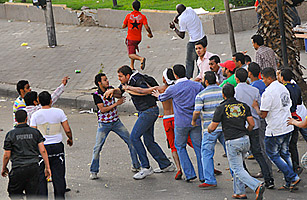
19-year-old Rojeh Reda says he hasn’t slept much the past five days. Cairo University literature student and Shakespeare buff says he and his two friends have made it their mission to patrol and monitor the streets of his neighborhood, Imbaba, a poor working-class district in Cairo.
Over the weekend, fighting in Imbaba between hundreds of Muslims and Christians left at least 12 people dead, more than 200 wounded and two churches in flames, in the latest outbreak of sectarian violence since President Hosni Mubarak was ousted in February. Reda stops at the Church of the Virgin Mary, most of its interior still covered in soot, and leafs through a charred hymnal. “Yes, we say Muslims and Christians are one hand,” says Reda, a Coptic Christian, citing a common chant from Egypt’s democratic uprisings. “But there are big problems here and no one likes talking about them until this happens.” Copts, a Christian sect who consider themselves indigenous Egyptians make up roughly 10 percent of the majority Sunni Muslim country.
Egypt’s governing military council quickly announced trials for 190 people arrested in the violence. But a crowd of thousands, including both Copts and Muslims, gathered in protest on Sunday and Monday outside the state television building, haranguing the military government for not preventing the violence and calling for the resignation of the military leader, Field Marshal Mohamed Hussain Tantawi.
TIME’s Complete Coverage: The Middle East in Revolt